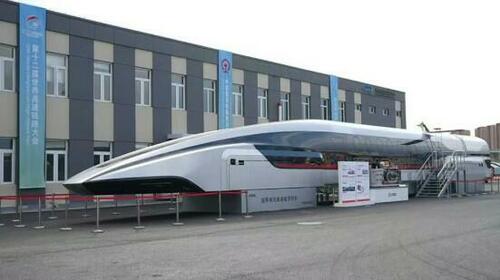China’s 373MPH Maglev Train Debuts, Slashing Travel Time Between Cities

A Chinese-built maglev train, set to become the country’s fastest ground transport vehicle, was publicly unveiled this week at the 17th Modern Railways exhibition in Beijing, according to South China Morning Post.
Developed by China Railway Rolling Stock Corporation (CRRC), the train can reach speeds of 600km/h (373mph) and is designed to drastically cut travel times and strengthen China’s global lead in high-speed rail.
The train features a sleek, aerodynamic nose to reduce drag, and a futuristic interior with a large digital display.
The train is intended to function as a “point-to-point transport tool” between major cities, complementing existing high-speed rail. At full speed, it could cut the Beijing–Shanghai trip from 5.5 hours to about 2.5.
“This model is equipped with a fully automated driving function … [which] requires integrating a variety of technologies such as 5G communication, AI video capture, acoustic sensing, and the deployment of various types of sensors along the line,” CRRC engineer Shao Nan said.
He also noted the train aims to “fill the speed gap between high-speed rail and aviation within 2,000km,” blending the efficiency of rail with the speed of flight.
The maglev uses superconducting magnets to levitate above the track after reaching 150km/h, eliminating friction and enabling lower noise, no emissions, and reduced maintenance. Before that speed, the train runs on rubber wheels. The project is still undergoing route tests and safety evaluations before commercial launch.
Though China opened its first low-speed maglev line in 2003 with German technology, and domestic versions in Changsha (2016) and Beijing (2017), these earlier systems were limited to 120km/h. The new maglev marks a significant leap forward.
South China Morning Post writes that China’s broader high-speed rail network has rapidly expanded to 48,000km by the end of 2024, the largest in the world, with plans to surpass 50,000km this year.
CRRC’s maglev is just one of several cutting-edge transport projects underway. In 2024, China tested its maglev hyperloop project, aiming to eventually reach 1,000km/h, and researchers developed AI-based suspension systems to counter high-speed vibrations and improve ride comfort.
Despite these advances, experts cited by SCMP caution that the sector still faces steep technical and financial hurdles, including the high cost of building dedicated maglev and hyperloop infrastructure and the need for advanced technologies like superconducting magnets.
Loading…














